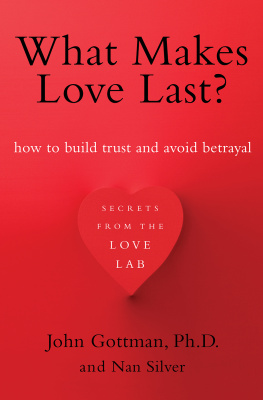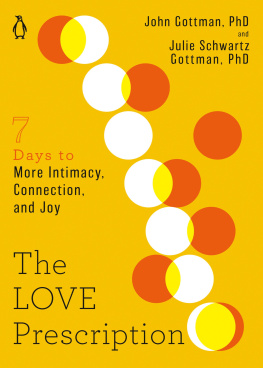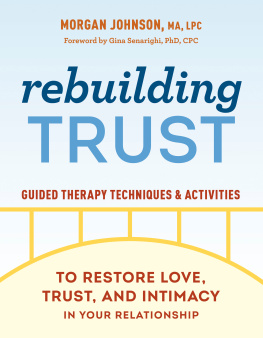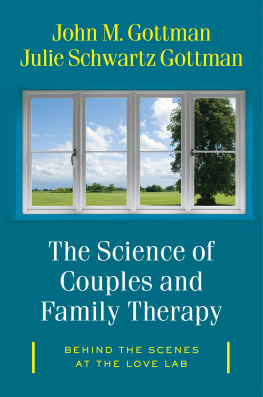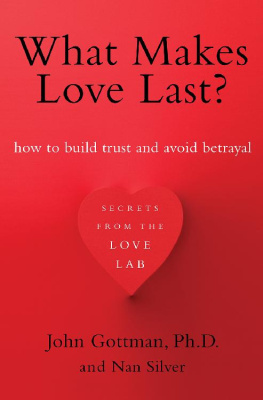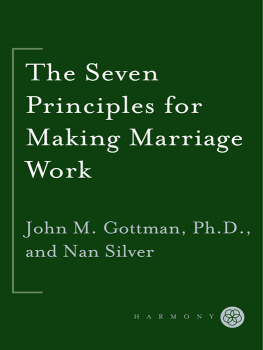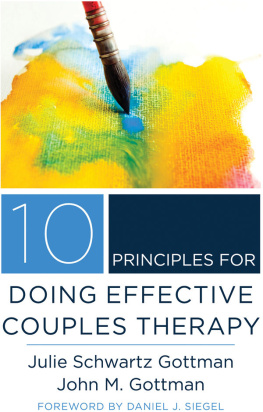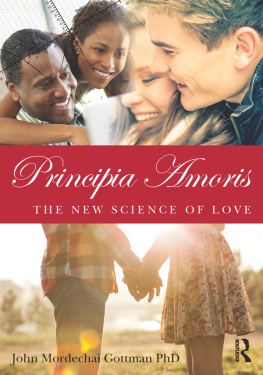ALSO BY THE AUTHORS
The Seven Principles for Making Marriage Work
Why Marriages Succeed or Fail:
And How You Can Make Yours Last
ALSO BY DR. JOHN GOTTMAN
The Relationship Cure:
A Five-Step Guide to Strengthening
Your Marriage, Family, and Friendships
Raising an Emotionally Intelligent Child
The Science of Trust:
Emotional Attunement for Couples
And Baby Makes Three:
The Six-Step Plan for Preserving Marital Intimacy
and Rekindling Romance After Baby Arrives
The Marriage Clinic:
A Scientifically Based Marital Therapy
A Couples Guide to Communication
Thank you for purchasing this Simon & Schuster eBook.
Sign up for our newsletter and receive special offers, access to bonus content, and info on the latest new releases and other great eBooks from Simon & Schuster.
C LICK H ERE T O S IGN U P
or visit us online to sign up at
eBookNews.SimonandSchuster.com

Contents
For my wife, Julie,
who really understands trust.
John
For my children,
Will and Elisabeth
Nan
Authors Note
The anecdotes and dialogue in this book are based on Dr. Gottmans years of experience studying and counseling couples. All names and identifying information have been changed. Transcripts have been edited for brevity and clarity. Some anecdotes use composite or fictive couples to illustrate Dr. Gottmans theories.
Angel: I have something to say
George: Hold on. Im not finished.
Angel: What I am trying to say
George: See and this is what Im talking about
Angel: Right, I know, because I do not
George: You cut in
Angel: I have to say something now
George: No. Because when you cut in
Angel: I have something to say here.
George: SHUT UP!
Angel and George were newlyweds juggling long work hours while raising two toddlers. Thats a situation tough enough to put pressure on any marriage, but you wouldnt need a background in research psychology to recognize that this one was in trouble. The dialogue above is a snippet of the argument they had in my research lab. They sparred without end over who worked harder, who did more housework and who said what when. Angel and George, like many embattled couples, gave up on their marriage and divorced. This outcome was not unexpected considering how damaged their relationship was. When I met with them, they could barely look at each other without scowling and rolling their eyes.
For years I have invited couples like Angel and George to take part in experiments at my Love Lab, the medias nickname for the facility at the University of Washington in Seattle, where I subject long-term romance to scientific scrutiny. In a typical study I analyze couples while they converse about everyday topics as well as when they argue. I interview them together and individually. Ive even observed couples while they spend an entire day at the Love Labs studio apartment, which comes complete with sofa, loveseat, TV, kitchen, a lake view, and video cameras hooked to the walls, which record every moment of their interactions. (The bathroom, of course, is off limits.) Thanks to these studies, I have accumulated nearly four decades worth of dataa library of how and what partners say to and about each other, and their physiological reactions. These days I also conduct similar exercises with couples who are not part of any study but wish to receive a scientific assessment of their relationships staying power.
When couples like Angel and George enter the Love Lab, we hook them up to enough sensors and wires to elicit quips about Dr. Frankenstein. While they adjust to the equipment and their surroundings, information begins to stream from the sensors, indicating their blood velocities, heart and pulse rates, the amount their palms sweat, and even how much they squirm in their chairs. A video camera records all of their words and body movements. On the other side of a one-way mirror, my assistants, surrounded by equipment readouts, and the requisite collection of empty cola cans, scrutinize the subtle interplay between the couples biological reactions, body language, facial expressions, and words.
The most frequent experiment I conduct is called the conflict discussion, in which we ask the couple to converse about an area of disagreement for fifteen minutes. To facilitate the analysis of their facial expressions during their disputes, I train a separate video camera on each of them so I can view their faces in real time on a split screen.
It no longer surprises me when our couples are able to relax and let it rip despite the staring cameras. Still, I find that most people do curb their behavior in the lab compared to when they squabble at home. But even when partners are acting camera ready, they cant hide from the accuracy of my sensors.
Close analysis of so many couples over the years led me to formulate seven key principles that can improve the odds of maintaining a positive relationship. Described in The Seven Principles for Making Marriage Work, they emphasize the value of friendship between partners, accepting each others influence, and being gentle during disagreements. These fundamentals remain a powerful tool set for all relationships. But the sad fate of couples like Angel and George indicated to me that these principles did not reach deep enough to salvage many damaged romances. I could not accept that these partners were somehow fated to be losers at love. To aid these despairing couples, I needed to better understand what was going wrong between them.
Perhaps what puzzled me most about the unhappy couples I studied or counseled was their sincere insistence that they were deeply in love and committed to their relationshipeven as they were ordering each other to shut up in the Love Lab. Why did so many self-proclaimed devoted couples engage in constant warfare? It made no sense. They derived no relationship benefits from their quarrels. They reported more distress over fighting than did happy couplesand yet they went at it more often.
It would be easy to assume that the unhappy couples argued more than others because, well, they disagreed more. What could be more logical? But as a scientist, I know that obvious conclusions are not always accurate. In my lab, computer scientist Dr. Tara Madyhastha helped me find the answer. To trace the anatomy of interactions between unhappy partners, she used what are called hidden Markov models. These types of computer analyses, often implemented to decode languages or DNA sequences, can detect underlying patterns. Her results indicated that couples who seem to act like adversaries rather than lovers are trapped by what is known, in technical terms, as an absorbing state of negativity. This means the probability that they will enter the state is greater than the odds that they will exit it. In other words, they get stuck. These unlucky partners are imprisoned in a roach motel for lovers: They check in, but they cant check out. Consumed by negativity, their relationships die there.
Understanding why some couples wind up in this terrible trap while others are able to sidestep it has been at the heart of my recent research. As a result, I have developed a new understanding of couple dynamics and an enhanced approach to bettering all romantic relationshipsnot just the ones in distress.
If you listened to trapped couples argue in my lab, you would hear a litany of complaints that wouldnt seem to have much in common. Tim grouses that Jane cares more about her mothers opinion than his. Alexis keeps stalling on starting a family, to the frustration of her husband. Jimmy doesnt like it that Pat wants to switch churches. But when I speak to these unhappy partners, I am struck by an underlying similarity. They are all talking (or shouting) past each other or not even bothering to communicate at all. Despite their commitment to sticking it out, they have lost something fundamental between lovers, a quality often termed magic or passion, that exists at a primitive, animal level. Thats why they end up in the roach motel.
Next page
